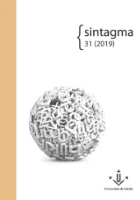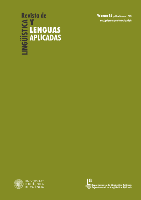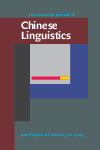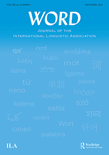
Sintagma
Scope & Guideline
Navigating the Evolving Landscape of Language.
Introduction
Aims and Scopes
- Linguistic Analysis of Spanish and Other Languages:
The journal emphasizes the comparative study of linguistic phenomena across different languages, particularly Spanish and Mandarin Chinese, focusing on aspects such as morphology, syntax, and pragmatics. - Second Language Acquisition (SLA):
A significant portion of the research investigates the processes and challenges involved in learning Spanish as a second language, exploring topics such as vocabulary acquisition, listening comprehension, and the influence of pedagogical approaches. - Cognitive and Discourse Analysis:
Studies often incorporate cognitive linguistics and discourse analysis to examine how language functions in communication, including the use of discourse markers and metaphors in various contexts. - Sociolinguistic Perspectives:
The journal also addresses sociolinguistic issues, such as the influence of cultural practices on language use, including the emergence of anglicisms in Spanish gastronomy and the representation of gender in literature. - Corpus-based Research:
Research employing corpus linguistics methodologies is highlighted, providing empirical evidence for linguistic theories, as seen in studies on biomedical terminology and grammatical constructions.
Trending and Emerging
- Pragmatics and Discourse Studies:
Research exploring pragmatic features in language, particularly in educational contexts or online interactions, has gained traction, indicating a growing interest in how language operates in social settings. - Interdisciplinary Approaches to Language Learning:
There is an increasing trend towards interdisciplinary studies that combine linguistic analysis with cognitive science and pedagogy, demonstrating the journal's commitment to practical applications of linguistic research. - Impact of Digital Communication on Language Use:
Emerging themes related to the influence of digital platforms on language, such as the analysis of online interactions and the adaptation of language in digital contexts, highlight the journal's engagement with contemporary issues. - Cognitive Linguistics and Language Acquisition:
A rising interest in cognitive approaches to understanding language acquisition reflects a broader trend in linguistics, emphasizing how cognitive processes influence learning and language use.
Declining or Waning
- Traditional Syntax and Morphology Studies:
There appears to be a decrease in purely theoretical papers focused on traditional aspects of syntax and morphology without practical application or cross-linguistic comparison, as seen in older publications. - Studies on Gender Representation in Literature:
The focus on gender representation within literary contexts seems to be waning, as fewer papers address this theme compared to previous years, indicating a possible shift towards more applied linguistic research. - Error Analysis in Second Language Learning:
Although still relevant, the frequency of studies specifically focused on linguistic errors in L2 acquisition has diminished, with more emphasis now placed on successful strategies for language learning rather than on errors.
Similar Journals

Revista Signos
Empowering Voices in the World of Linguistics and LiteratureRevista Signos, a prestigious publication by EDICIONES UNIV VALPARAISO, serves as a vital platform for scholars and practitioners in the fields of linguistics, language, literature, and literary theory. With an impact factor underscoring its academic excellence, the journal holds a commendable Q2 ranking in Linguistics and Language and a Q1 ranking in Literature and Literary Theory as of 2023. Its strong performance on Scopus, with ranks placing it in the 97th and 75th percentiles, respectively, illustrates its influential role in shaping contemporary discourse within these domains. Based in Chile, this journal not only disseminates critical research but also fosters intellectual dialogue, making it an essential resource for researchers, students, and professionals alike. Although it operates without open access, its commitment to quality and depth provides invaluable insights into the evolution of language and literature over its convergence years from 2007 to 2024. Engage with Revista Signos to explore the rich tapestry of linguistic and literary scholarship.

Revista de Linguistica y Lenguas Aplicadas
Shaping the Future of Language ScholarshipRevista de Linguistica y Lenguas Aplicadas, an esteemed journal published by UNIV POLITECNICA VALENCIA, EDITORIAL UPV, is a pivotal resource in the field of linguistics and applied languages. Since its inception, the journal has embraced Open Access publishing since 2006, ensuring that its rich repository of research is readily available to a global audience of researchers, academics, and language professionals. Headquartered in Valencia, Spain, the journal contributes significantly to the advancement of linguistics knowledge, boasting a respectable ranking within the Q3 quartile for Linguistics and Language (2023) according to Scopus metrics. It covers a diverse range of topics and methodologies, engaging readers through its commitment to scholarly rigor and innovation. The journal is uniquely positioned to inform and inspire essential discussions from 2015 to 2024, making it a vital platform for emerging linguists and seasoned scholars alike, as they explore the evolving landscapes of language and communication.

International Journal of Chinese Linguistics
Elevating Chinese Linguistics to Global StandardsInternational Journal of Chinese Linguistics is a distinguished publication that delves into various aspects of linguistic studies pertaining to the Chinese language. Published by John Benjamins Publishing Co, this journal stands out for its commitment to advancing the knowledge and understanding of Chinese linguistics within the global academic community. With an impact factor that places it in the Q2 quartile of linguistics and language, the journal is indexed in prominent databases, achieving ranks of #501 in Arts and Humanities and #580 in Social Sciences. These rankings reflect the journal's dedication to maintaining high scholarly standards and its relevance in both linguistic research and practical applications. While not categorized as Open Access, the journal provides necessary access through institutional subscriptions, thereby ensuring that valuable research reaches a broad audience. Covering a wide range of topics from syntax and phonetics to sociolinguistics and applied linguistics, the International Journal of Chinese Linguistics serves as an essential resource for researchers, professionals, and students seeking to deepen their understanding of the intricate relationship between language and culture in the Chinese context. With converging years from 2019 to 2024, it continues to evolve, reflecting ongoing developments in the field.

Functions of Language
Navigating the Complexities of Language UseFunctions of Language, published by John Benjamins Publishing Co, serves as a vital platform for scholars and practitioners in the fields of linguistics and language studies. With its ISSN 0929-998X and E-ISSN 1569-9765, this esteemed journal, based in the Netherlands, has solidified its reputation through a focused dedication to exploring the multifaceted roles that language plays across various contexts. Ranked in the top percentile of leading journals in Linguistics and Language (Q2 category, 2023) and holding impressive Scopus ranks within both the Arts and Humanities and Social Sciences sectors, the journal emphasizes research that interlinks theoretical insights with practical implications. Functions of Language aims to advance our understanding of linguistic structures and their applications, making it an essential resource for researchers, professionals, and students alike who are eager to contribute to the evolving discourse in language studies. With content converging from 1994 to 2024, the journal reflects ongoing scholarly engagement and innovation in the field.

Cadernos de Estudos Linguisticos
Connecting scholars and ideas in the world of linguistics.Cadernos de Estudos Linguisticos, published by UNIV ESTADUAL CAMPINAS, INST ESTUDOS LINGUAGEM, stands as a pivotal platform in the field of linguistic studies since its inception in 1978. With its commitment to Open Access, this journal fosters the dissemination of cutting-edge research, ensuring that knowledge is accessible to a global audience. This also enhances collaboration among researchers, professionals, and students dedicated to exploring the nuances of language. The journal proudly carries the ISSN 0102-5767 and E-ISSN 2447-0686, attesting to its uninterrupted quality and relevance in linguistic scholarship. By addressing various facets of language studies, including syntax, semantics, and sociolinguistics, this esteemed journal is a vital resource for advancing understanding and innovation in the field.

WORD-JOURNAL OF THE INTERNATIONAL LINGUISTIC ASSOCIATION
Navigating the evolving landscape of language research.WORD-JOURNAL OF THE INTERNATIONAL LINGUISTIC ASSOCIATION is a leading peer-reviewed journal dedicated to advancing the field of linguistics and language studies. Published by Routledge Journals, Taylor & Francis Ltd, this esteemed journal has earned a reputation for its rigorous scholarship, reflected in its 2023 Q2 ranking in Linguistics and Language and its solid performance in Scopus Ranks. Encompassing a wide range of topics—from theoretical frameworks to empirical research—WORD serves as an essential resource for linguistics researchers, educators, and students alike. While currently not operating under an open access model, the journal is committed to providing high-quality, impactful research articles that contribute significantly to the linguistic community. With its convergence periods from 1998 to 2009 and 2015 to 2024, WORD continuously fosters the discourse of language studies, ensuring that critical insights and discussions are accessible for ongoing academic exploration.

RUSSIAN LINGUISTICS
Illuminating the intersections of language and psychology.RUSSIAN LINGUISTICS is a peer-reviewed academic journal published by Springer, dedicated to advancing the understanding of the Russian language and its interplay with various linguistic frameworks. With a longstanding history that spans from its inception in 1974, the journal encompasses a broad range of topics within the fields of linguistics and language studies, offering valuable insights especially in *Developmental and Educational Psychology* and the intricacies of linguistics at large. Currently ranked in the Q2 quartile for Linguistics and Language, and holding substantial positions within Scopus rankings, RUSSIAN LINGUISTICS serves as an essential resource for researchers, educators, and students alike, fostering dialogue and collaboration within the international linguistic community. The journal notably provides critical access to research findings that enhance the comprehension of Russian linguistics' role in a global context, despite operating under a traditional access model. For those pursuing scholarly excellence, RUSSIAN LINGUISTICS remains a pivotal platform for disseminating innovative research and promoting the study of language.

Lingue e Linguaggio
Illuminating the Intersections of Language and SocietyLingue e Linguaggio, published by SOC ED IL MULINO, is a distinguished academic journal in the field of Linguistics and Language, hailing from Bologna, Italy. With an esteemed Q2 ranking in its category as of 2023, this journal is recognized for its contributions to both the arts and humanities as well as social sciences, achieving notable positions within Scopus rankings. It serves as a vital platform for researchers, practitioners, and students interested in exploring various linguistic phenomena, language dynamics, and theoretical frameworks. Although it operates under a traditional subscription model rather than open access, its comprehensive array of studies and publications provides significant insights and fosters academic discourse. With a publication period extending from 2002 to 2024, Lingue e Linguaggio continues to be a key resource for advancing the understanding of language in contemporary contexts.

Glossa-A Journal of General Linguistics
Unlocking the Secrets of Language and TheoryGlossa: A Journal of General Linguistics, published by the Open Library of Humanities, stands as a leading voice in the realm of linguistic research since its inception in 2016. With its Q1 category ranking in Linguistics and Language and impressive Scopus ranks encompassing the top 83rd and 81st percentiles in its respective fields, Glossa fosters a vibrant academic community committed to the rigorous exploration of language and linguistic theory. Operating under an open access model, the journal not only enhances the visibility of groundbreaking research but also ensures that valuable insights are accessible to a global audience. The journal's commitment to interdisciplinary dialogue makes it an indispensable resource for scholars, professionals, and students eager to engage with contemporary developments in linguistics. As it converges into 2024, Glossa continues to champion innovative scholarship and critical discourse that challenges conventional boundaries within the field.

NEUPHILOLOGISCHE MITTEILUNGEN
Fostering Academic Excellence in Linguistic ResearchNEUPHILOLOGISCHE MITTEILUNGEN, published by the esteemed Modern Language Society, stands as a significant contribution to the domain of Language and Linguistics. With a history dating back to 1971, this journal has consistently provided an academic platform for researchers and scholars, navigating through the intricacies of philology and linguistic studies. Although it is indexed in Scopus with rankings reflecting its position in the Arts and Humanities and Social Sciences categories, it currently does not offer Open Access, which may require interested parties to seek institutional access for its wealth of content. The journal has experienced periods of coverage discontinuation in recent years, yet it remains a valued source for advancing the understanding of language theories and linguistic practices. Its location in Helsinki, Finland, offers a unique European perspective on global linguistic issues. The journal is ideal for those looking to engage with evolving linguistic trends and contribute to contemporary discussions in the field.